Biblical numerology has fascinated scholars, theologians, and believers for centuries. The biblical meaning of numbers goes far beyond simple counting, revealing profound spiritual truths and divine patterns woven throughout Scripture. This comprehensive guide explores the spiritual meaning of numbers 1-40, examining how Hebrew Linguistics and Biblical Applications combine to create a rich tapestry of symbolic meaning.
Understanding Biblical Numerology
Biblical numerology is the study of numbers in Scripture and their symbolic meanings. Unlike secular numerology, biblical number symbolism is rooted in God’s character and His divine plan for humanity. Each number carries specific significance that reflects Divine Order and spiritual principles.
The Hebrew language provides the foundation for understanding these numerical meanings. In Hebrew Linguistics, each letter corresponds to a number, creating a system where words and numbers interconnect in meaningful ways. This practice, known as Gematria, reveals hidden layers of meaning in biblical texts.

How Biblical Numerology Works
Biblical numbers function on multiple levels:
- Literal Level: The actual quantity or measurement
- Symbolic Level: Spiritual significance and divine principles
- Prophetic Level: Future events and divine timing
- Typological Level: Patterns that point to Christ and redemption
The spiritual meaning of numbers emerges through consistent patterns throughout Scripture. When God uses specific numbers repeatedly in similar contexts, we can discern His intended meaning.

Hebrew Number System and Letters
The Hebrew alphabet serves as both letters and numbers, creating a unique system where every word has numerical value. This connection between language and mathematics reflects the divine nature of Scripture itself.
| Hebrew Letter | Numerical Value | English Equivalent |
|---|---|---|
| Aleph (א) | 1 | A |
| Beth (ב) | 2 | B |
| Gimel (ג) | 3 | G |
| Daleth (ד) | 4 | D |
| Hey (ה) | 5 | H |
| Vav (ו) | 6 | V/W |
| Zayin (ז) | 7 | Z |
| Chet (ח) | 8 | Ch |
| Teth (ט) | 9 | T |
| Yod (י) | 10 | Y |
Understanding these Hebrew foundations enhances our comprehension of biblical numerology and its applications in Scripture interpretation.
Spiritual Meaning of Numbers 1-10: Foundation Numbers
Number 1 – Aleph: Unity and Beginning
The number 1 (Aleph) represents unity, singularity, and divine supremacy. In Scripture, one emphasizes God’s uniqueness and the beginning of all things.
Biblical Examples:
- “Hear, O Israel: The Lord our God, the Lord is one” (Deuteronomy 6:4)
- One God, one faith, one baptism (Ephesians 4:5)
- Jesus as the “one mediator” (1 Timothy 2:5)
The spiritual meaning of one encompasses God’s absolute sovereignty and the unity believers share through Christ. It represents the starting point of all creation and the foundation of monotheistic faith.
Number 2 – Beth: Division and Witness
2 (Beth) signifies division, witness, and testimony. This number represents the concept of confirmation through multiple witnesses and the separation between good and evil.
Key Biblical Themes:
- Two witnesses establish truth (Deuteronomy 19:15)
- Jesus sent disciples two by two (Mark 6:7)
- Two tablets of the law (Exodus 31:18)
- Heaven and earth as dual realms
The double witness principle demonstrates God’s desire for confirmation and accountability in spiritual matters. Number two also reflects the duality inherent in human experience – light and darkness, good and evil, flesh and spirit.
Number 3 – Gimel: Divine Fullness and Perfection
3 (Gimel) represents divine fullness, completeness, and perfection. This number appears consistently in contexts involving divine manifestation and spiritual completeness.
Scriptural Significance:
- Trinity: Father, Son, Holy Spirit
- Jesus’ three-day burial and resurrection
- Three-fold witness in heaven (1 John 5:7)
- Jonah’s three days in the whale
The number three embodies divine fullness and represents God’s complete revelation of Himself. It signifies wholeness, stability, and the manifestation of divine power.

Number 4 – Daleth: Earth and Material Creation
4 (Daleth) symbolizes the earth and material creation. This number relates to the physical world and earthly completeness.
Biblical Occurrences:
- Four cardinal directions (north, south, east, west)
- Four seasons of the year
- Four living creatures in Revelation
- Four corners of the earth
The earth number emphasizes God’s sovereignty over the physical realm and His care for material creation. It represents universality and completeness in the earthly sphere.
Number 5 – Hey: Grace and Divine Favor
5 (Hey) represents grace, divine favor, and God’s goodness toward humanity. This number consistently appears in contexts involving God’s unmerited blessing.
Examples of Grace:
- Five loaves feeding five thousand
- Five wise virgins (Matthew 25:2)
- David’s five smooth stones (1 Samuel 17:40)
- Five books of Moses (Torah)
Grace manifests through God’s provision, protection, and blessing. The number five reminds us that God’s favor cannot be earned but flows from His loving nature.
Number 6 – Vav: Man and Human Labor
6 (Vav) symbolizes man, human effort, and the incomplete nature of human works. This number is associated with humanity’s creation and limitations.
Human Characteristics:
- Man created on the sixth day
- Six days of labor followed by rest
- Human government and secular authority
- The number of the beast: 666 (Revelation 13:18)
Man’s number reveals both human dignity as God’s image-bearers and human inadequacy apart from divine grace. It represents the incomplete nature of human achievement.
Number 7 – Zayin: Completion and Spiritual Perfection
7 (Zayin) represents completion, spiritual perfection, and divine rest. This is perhaps the most significant number in biblical symbolism.
Perfect Completion Examples:
- Seven days of creation
- Seven churches in Revelation
- Seven spirits of God
- Sabbath as the seventh day
Spiritual perfection through the number seven demonstrates God’s complete work and His perfect timing. It signifies the fullness of God’s purposes and the ultimate rest found in Him.
Number 8 – Chet: New Beginning and Regeneration
8 (Chet) symbolizes new beginning, regeneration, and resurrection life. This number represents fresh starts and divine transformation.
New Beginning Patterns:
- Eight people saved in Noah’s ark
- Circumcision on the eighth day
- Jesus’ resurrection on the “eighth day”
- New creation themes
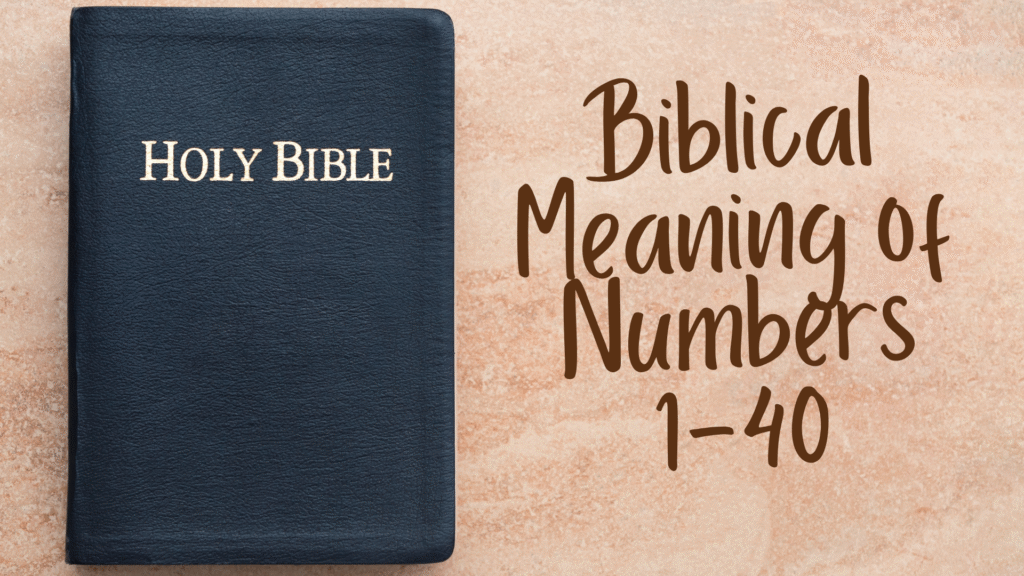
New beginning through number eight points to God’s power to transform and renew. It represents the resurrection life available through Christ and the believer’s new identity.
Number 9 – Teth: Visitation and Divine Judgment
9 (Teth) represents visitation, divine investigation, and God’s judgment. This number appears in contexts where God intervenes in human affairs.
Divine Visitation Examples:
- Nine months of pregnancy (bringing forth life)
- Jesus died at the ninth hour
- Nine gifts of the Spirit (1 Corinthians 12:8-10)
- Hosea’s unfaithful wife bore children for nine months
Visitation encompasses both God’s blessing and His judgment. The number nine reminds us that God actively observes and responds to human actions.
Number 10 – Yod: Divine Order and Law
10 (Yod) represents Divine Order, completeness of divine government, and the law of God. This number signifies perfect divine administration.
Divine Order Manifestations:
- Ten Commandments
- Ten plagues on Egypt
- Tithe as one-tenth
- Ten virgins in Jesus’ parable
Divine Order through the number ten establishes God’s perfect standards and governmental principles. It represents the complete revelation of God’s law and moral order.
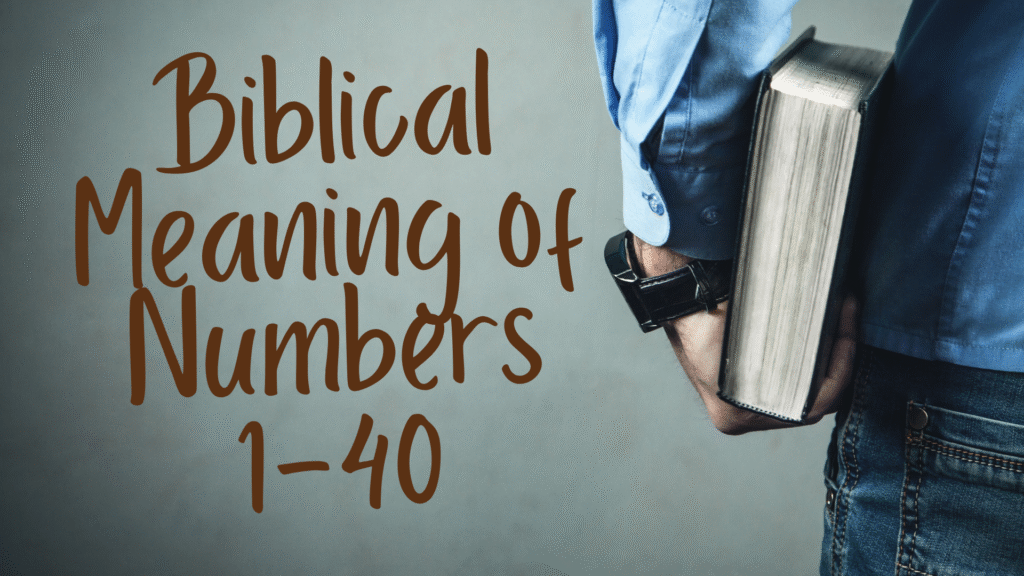
Spiritual Meaning of Numbers 11-20: Transition and Development
Numbers 11-13: Imperfection and Disorder
11 (Yod-Aleph) represents imperfection, disorder, and incompleteness. This number often appears in contexts of rebellion or falling short of God’s standards.
12 (Yod-Beth) symbolizes governmental perfection and divine authority. The twelve tribes of Israel and twelve apostles demonstrate God’s perfect governmental structure.
13 (Yod-Gimel) signifies rebellion and depravity. This number consistently appears in contexts of opposition to God’s will.
Numbers 14-17: Deliverance and Victory
14 (Yod-Daleth) represents deliverance and release from bondage. This deliverance theme appears throughout Scripture as God frees His people.
15 (Yod-Hey) symbolizes new direction and divine guidance. When God provides new direction, He leads His people into His purposes.
16 (Yod-Vav) represents love and affection. God’s love manifests through His care and provision for His people.
17 (Yod-Zayin) signifies victory and triumph. This victory comes through God’s power working on behalf of His people.
Numbers 18-20: Bondage and Redemption
18 (Yod-Chet) represents oppression and bondage. This oppression often precedes God’s intervention and deliverance.
19 (Yod-Teth) symbolizes faith and hearing. The connection between faith and hearing emphasizes the importance of receiving God’s word.
20 (Kaph) represents redemption and freedom. God’s redemption brings complete liberation from sin and bondage.
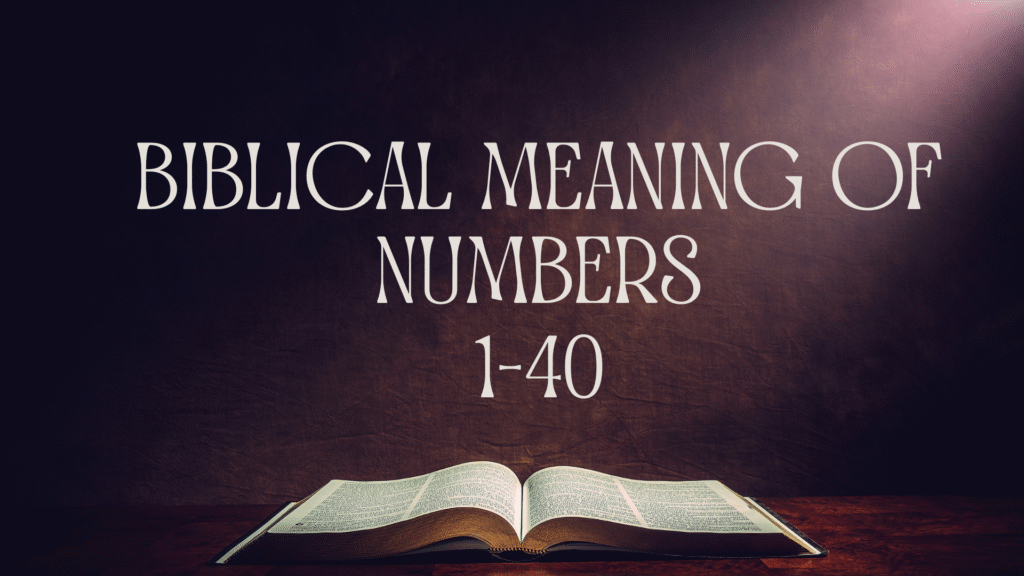
Spiritual Meaning of Numbers 21-30: Spiritual Growth and Maturity
Numbers 21-25: Spiritual Development
21 (Kaph-Aleph) represents distress and trial and testing. These trials serve to develop spiritual maturity and dependence on God.
22 (Kaph-Beth) symbolizes sonship and spiritual authority. Sonship reflects the believer’s position and authority in Christ.
23 (Kaph-Gimel) signifies death and resurrection life. This transformation represents the believer’s identification with Christ’s death and resurrection.
24 (Kaph-Daleth) represents priesthood and spiritual service. The priesthood enables believers to minister before God and intercede for others.
25 (Kaph-Hey) symbolizes blessing and divine favor. God’s blessing flows to those who walk in obedience and faith.
Numbers 26-30: Ministry and Service
26 (Kaph-Vav) represents the power of salvation and deliverance through faith. This power of salvation transforms lives and circumstances.
27 (Kaph-Zayin) symbolizes the ministry of salvation and spiritual service. The ministry of salvation involves sharing God’s redemptive work with others.
28 (Kaph-Chet) represents the leading of the Spirit and divine guidance. The leading of the Spirit directs believers into God’s will and purposes.
29 (Kaph-Teth) signifies departure and transition. Departure often marks the beginning of new phases in spiritual journey.
30 (Lamed) represents dedication for rulership and spiritual authority. Dedication for rulership prepares individuals for positions of spiritual leadership.
Spiritual Meaning of Numbers 31-40: Legacy and Testing
Numbers 31-35: Covenant and Inheritance
31 (Lamed-Aleph) represents offspring and spiritual legacy. Offspring encompasses both natural and spiritual descendants who carry forward God’s purposes.
32 (Lamed-Beth) symbolizes covenant relationship with God. The covenant establishes the foundation for all of God’s dealings with His people.
33 (Lamed-Gimel) signifies a sign and divine confirmation. A sign provides evidence of God’s involvement and validates His promises.
34 (Lamed-Daleth) represents identification and knowing one’s purpose. Identification involves understanding one’s role in God’s plan.
35 (Lamed-Hey) symbolizes vindication and divine justification. Vindication demonstrates God’s righteousness and faithfulness to His people.
Numbers 36-40: Adversity and Testing
36 (Lamed-Vav) represents adversary and enemy opposition. The adversary seeks to oppose God’s purposes but ultimately serves His sovereign plan.
37 (Lamed-Zayin) symbolizes inheritance and receiving God’s promises. This inheritance includes both earthly and heavenly blessings.
38 (Lamed-Chet) represents work and labor. Meaningful work serves God’s purposes and contributes to His kingdom.
39 (Lamed-Teth) signifies infirmity and human weakness. Infirmity reminds us of our dependence on God’s strength and grace.
40 (Mem) represents trial, probation, and testing. This trial period serves to purify, strengthen, and prepare God’s people for greater service.
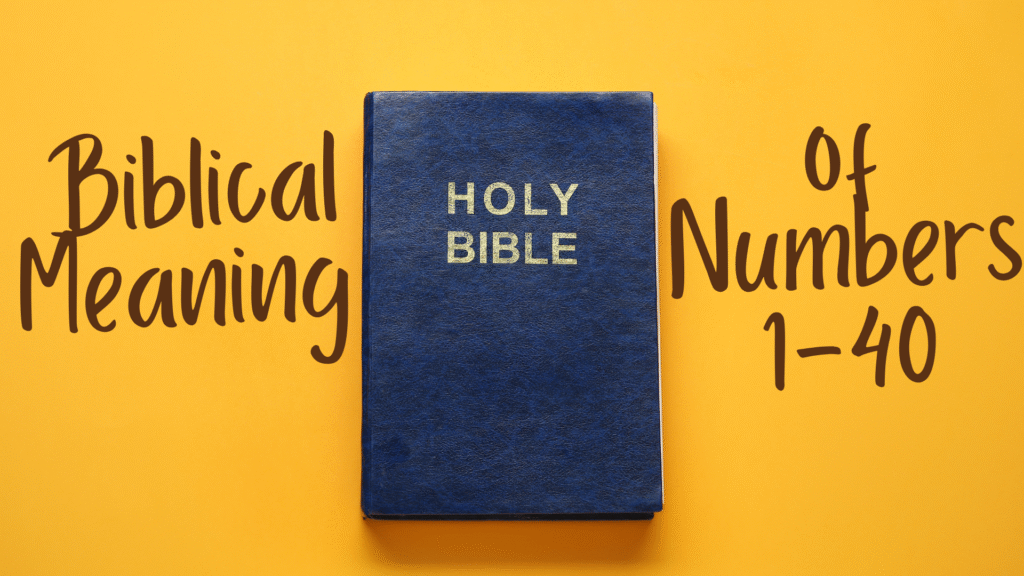
Charts and Biblical Applications
Summary Table of Numbers 1-40
| Number | Hebrew Letter | Meaning | Key Examples |
|---|---|---|---|
| 1 | Aleph | Unity | One God, one faith |
| 2 | Beth | Division, Witness | Two tablets, two witnesses |
| 3 | Gimel | Divine Fullness | Trinity, resurrection |
| 4 | Daleth | Earth, Creation | Four directions, seasons |
| 5 | Hey | Grace | Five loaves, five stones |
| 10 | Yod | Divine Order | Ten Commandments |
| 12 | Yod-Beth | Governmental Perfection | Twelve tribes, apostles |
| 20 | Kaph | Redemption | Age of accountability |
| 30 | Lamed | Dedication | Jesus’ ministry began |
| 40 | Mem | Trial, Testing | Flood, wilderness, fasting |
Translating Hebrew Numbers in Biblical Context
Understanding Hebrew Linguistics enhances biblical interpretation by revealing numerical patterns that might otherwise be missed. When translating Hebrew texts, scholars consider both the literal numbers and their symbolic significance.
The Biblical Applications of numerology include:
- Prophetic Interpretation: Understanding timing and divine appointments
- Typological Studies: Recognizing patterns that point to Christ
- Spiritual Discernment: Discerning God’s purposes in life circumstances
- Worship and Prayer: Incorporating biblical patterns in spiritual practices
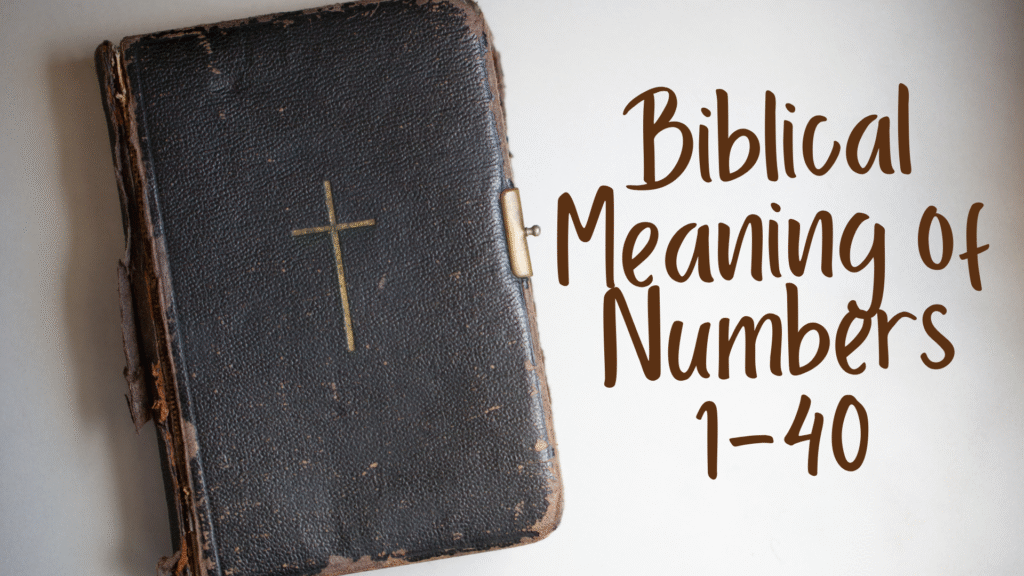
Hebrew Observations and Practical Applications
Key Observations in Biblical Numerology
Hebrew Linguistics reveals several important principles:
- Consistency: Numbers maintain consistent symbolic meanings throughout Scripture
- Progressive Revelation: Numerical meanings develop and expand across biblical history
- Christological Focus: All numbers ultimately point to Christ and His redemptive work
- Practical Application: Numerical patterns provide guidance for Christian living
Modern Applications of Biblical Numerology
Contemporary believers can apply biblical numerology through:
- Scripture Study: Looking for numerical patterns in biblical texts
- Personal Reflection: Considering how biblical numbers relate to life circumstances
- Prayer and Meditation: Using biblical numbers as frameworks for spiritual disciplines
- Teaching and Preaching: Incorporating numerical symbolism in biblical instruction
Frequently Asked Questions
What do numbers symbolize in the Bible?
Numbers in the Bible symbolize spiritual principles, divine attributes, and God’s character. Each number carries specific meaning that reflects God’s nature and His relationship with humanity. Biblical numerology reveals patterns that enhance our understanding of Scripture and God’s purposes.
What does the number 100 signify in the Bible?
The number 100 represents completeness and fullness in the earthly realm. It signifies perfect earthly order and the complete manifestation of God’s purposes in the material world. Examples include the hundredfold return Jesus promised (Matthew 19:29) and Abraham’s age when Isaac was born.
What does numbering the people mean in the Bible?
Numbering people in Scripture often represents human attempts to assess strength or resources apart from faith in God. David’s census (2 Samuel 24) resulted in judgment because it reflected trust in military might rather than divine power. However, God also commanded legitimate censuses for organizational purposes.
What does the number 20 mean biblically?
The number 20 (Kaph) represents redemption and the complete waiting period before divine action. It often marks transitions from one phase of life to another, representing the fullness of time required for spiritual development and preparation.
Final Thoughts
Biblical numerology provides a fascinating window into God’s character and His methods of communication. The biblical meaning of numbers reveals divine patterns that enhance our understanding of Scripture and deepen our relationship with God.
Through Hebrew Linguistics and careful Biblical Applications, we discover that God speaks through numbers just as clearly as He speaks through words. Each number from 1 to 40 carries profound significance that illuminates spiritual truths and divine principles.
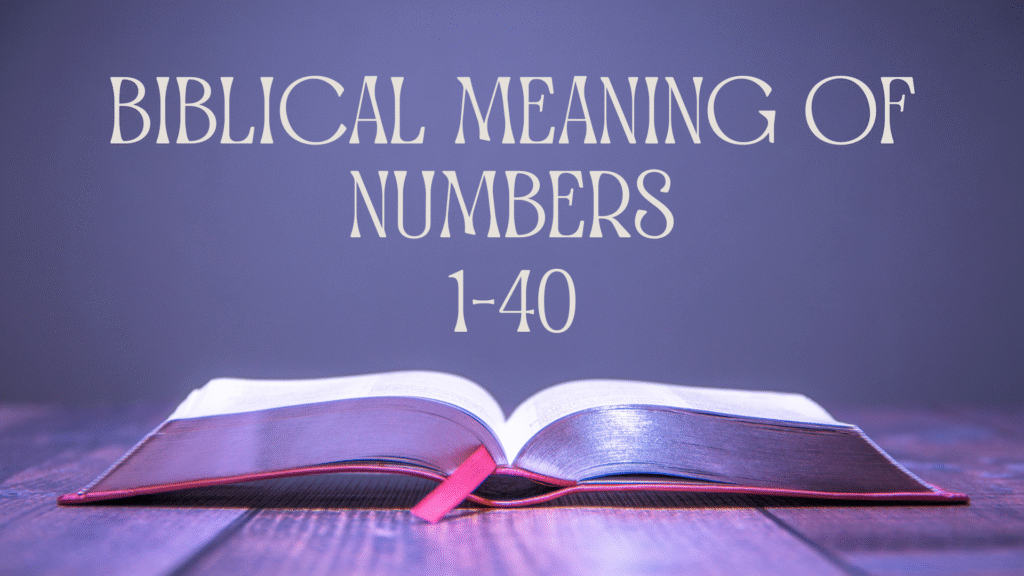
The spiritual meaning of numbers encourages believers to look beyond surface appearances and discover the deeper patterns God has woven throughout His Word. Whether through unity (1), divine fullness (3), grace (5), or trial (40), biblical numbers reveal God’s character and His purposes for His people.
Understanding biblical numerology enriches our Biblical Applications and enhances our ability to discern God’s voice in His Word. As we study these numerical patterns, we gain deeper insight into God’s nature and His amazing plan for humanity.
The study of Hebrew Linguistics and biblical numerology ultimately points us to Christ, who embodies all of God’s purposes and fulfills every numerical pattern in Scripture. Through Him, we experience the unity, grace, redemption, and victory that these sacred numbers represent.

Catherine Frank, founder of BiblicalHorizon.com, shares daily prayers and Bible verses to nurture spiritual growth. With a lifelong passion for scripture and prayer traditions, she creates accessible spiritual content that resonates with both seasoned believers and newcomers seeking divine connection.



